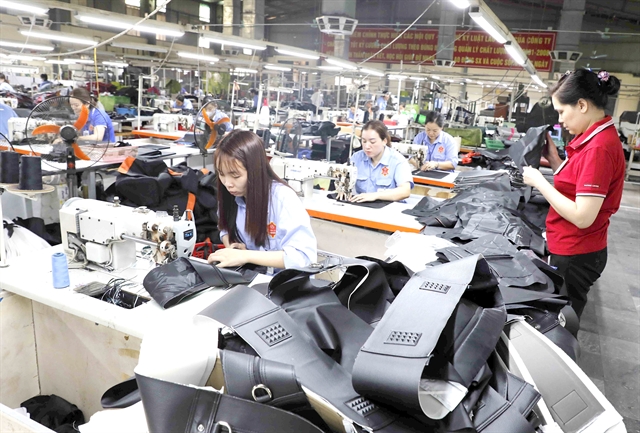 Society
Society

The Hà Nội Centre for Employment Service has organised an online job transaction session connecting nine northern provinces and cities – the first of its kind this year.

|
| People work at a company in Gia Lâm District in Hà Nội. — VNA/VNS Photo Trần Việt |
HÀ NỘI — The Hà Nội Centre for Employment Service (HCES) aims to comprehensively innovate and fundamentally change its professional job creation activities this year.
The HCES, under the Hà Nội Department of Labour, Invalids and Social Affairs, has organised an online job transaction session connecting nine northern provinces and cities – the first of its kind this year.
The session was held at No 215 Trung Kính Street right after the Lunar New Year festival.
To ensure convenience for workers to conduct transactions, the HCES rearranged departments, dedicating the entire first floor to the tasks of consulting policies, employment and recruitment.
Deputy Director of the HCES Vũ Quang Thành said, "Upgrading, renovating and modernising the centre requires a lot of time and resources. Therefore, we proactively rearrange working areas to become more scientific and effective, creating the best conditions for workers and businesses to connect, access job opportunities and recruit.”
The rearrangement was carried out before the Tết holiday.
Now workers coming to HCES can search for job opportunities either in person or online, and participate in online interviews with employers via the computer system.
In addition, job trading sessions are organised synchronously at all 15 job trading floors in Hà Nội, providing timely support to businesses and workers in job introduction, vocational training, labour export and implementing unemployment insurance policy.
Strengthen connection
Notably, the HCES’s innovation also aims to well conduct the unemployment insurance policy in the capital city, creating conditions for unemployed workers to not only receive benefits from unemployment insurance, but also have access to labour market information in the easiest way.
Accordingly, the HCES organises a department in the second floor to handle administrative procedures on unemployment insurance.
At the same time, right at the HCES, unemployed workers are consulted and provided with recruitment and employment information, including vocational training information if they need to change jobs.
Vũ Đình Phúc, living in Thường Tín District in Hà Nội, had worked for a Japanese manufacturing company but lost the job not long ago because the company cut its staff.
He said, "Coming to the HCES, along with resolving unemployment insurance, I can access many sources of labour recruitment. I see many new job opportunities because many other enterprises need more workers. The important thing is to consider and learn about a working environment that suits my ability and skills."
Tô Thị Thúy Hằng, who lives in Cầu Giấy District, just graduated from the Hà Nội Community College majoring in Information Technology and participated in internships at many businesses.
“At the job transaction session, I got a lot of recruitment information from companies and believe that I will have a stable job in the near future," she said.
Bùi An, Manager of the Đông Anh Satellite Job Exchange, located at the Bắc Thăng Long Technical and Economic School, said that following the HCES's policy, the exchange had many innovations in its work.
In addition to organising synchronous sessions with other exchanges, Đông Anh will also arrange monthly sessions with the participation of 20-25 businesses.
It coordinates with communes and towns to collect information about workers who need vocational training and to find jobs.
On that basis, the exchange selects businesses with job positions that suit the needs of workers to proactively connect supply and demand.
Deputy Director Thành said, "The HCES's staff is determined to comprehensively strengthen connections between labour supply and demand, reduce unemployment, and support sustainable career changes for workers. We also promote information technology application and improve our work efficiency."
All of the HCES’s efforts aim to successfully complete the general goals of the municipal labour, invalids and social affairs sector this year, which are to create new jobs for 165,000 workers, reduce the urban unemployment rate to less than three per cent, and raise the rate of trained workers to 74.2 per cent. — VNS




